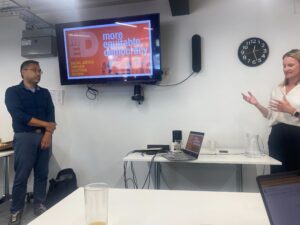What can we learn from the political reform achieved in Oregon?

More Equitable Democracy (MED) achieved political reform in Portland Oregon, are there lessons we can learn from their campaign to help us win here in the UK and could working with more communities of colour be a key to our success?

On Thursday 6th July, George Cheung from More Equitable Democracy (MED) joined a lunch with Electoral Reform Society as the guest speaker to share his insights.
Established in 2018, MED is a US-based non-profit organisation that collaborates with communities of colour to promote electoral system reforms and increase representation for underrepresented groups. They aim to strengthen democratic bonds, empower communities through education and research, and facilitate long-term change.
Cheung, the executive director shared insights into MED’s successful campaign for political reform in Portland, Oregon, where they advocated for the adoption of the single-transferable vote, marking the first US city to do so in nearly a century. Their work focuses on advancing racial equity through electoral systems change in the United States.
He stated that while electoral systems have a significant impact on political representation, winner-takes-all elections and redistricting in the US have created barriers for communities of colour, limiting their ability to elect their preferred candidates and undermining their political empowerment.
Despite legal protections, there are limitations and challenges, including costly and time-consuming lawsuits that rely on segregation for remedies, hindering progress.
More Equitable Democracy provides technical assistance to grassroots activists, including strategic planning, facilitation, coalition development, fundraising, and training. They aim to foster stronger coalitions centred around racial equity and garner broad-based support for bold solutions, specifically ranked choice voting and proportional representation.
Their Electoral Dashboard, developed over a year, serves as a tool to guide grassroots organisations in examining local electoral systems from a racial equity perspective. It helps identify what is and isn’t working, review policies, practices, and outcomes, and facilitate transformative policy campaigns and community-based decision-making on structural changes.
While the UK has differences in electoral systems and racial and ethnic makeup, examining electoral systems from an equity perspective can yield benefits. It promotes inclusivity, addresses disparities in political representation, gives marginalised communities a stronger voice, identifies and rectifies barriers, and fosters a more diverse and participatory political landscape.
There were many voices in the room, including members of the Democracy Network’s Council of Reference. Whilst many seemed fascinated and inspired, the discussion also sparked curiosity about applying these concepts in the UK context, highlighting the need for examining our electoral systems from an equity standpoint, using data to educate communities, facilitate structural changes, and launch transformative policy campaigns. This approach aims to create a more representative democracy where every citizen’s vote is valued and impactful.
However, there are advantages to analysing our electoral systems through an equity lens, including racial considerations, and utilising data to educate affected communities, enable community-based decision-making for structural reforms, and drive transformative policy campaigns. This approach contributes to a more inclusive and representative democracy by addressing potential disparities in political representation and empowering marginalised communities. It aids in identifying and rectifying barriers that unfairly impact specific groups, promoting fairness and ensuring equitable value and impact for all voters. Moreover, it creates a diverse and inclusive political environment, encouraging increased participation and increasing trust in the democratic process.
As The Democracy Network, we want to build a democracy fit for the 21st century and if inclusion, participation and increasing trust in politics are at the heart of the change, then ideas such as the one’s MED champions must be something we all take time to consider and investigate more closely. Big thanks to the Electoral Reform Society for a fascinating discussion. .
To find out more about More Equitable Democracy, check out their website here.
To join us in helping to build a stronger democracy in the UK, why not become a member of The Democracy network?
